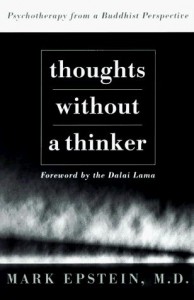The Big Ideas!
- What causes emotional suffering? It’s not what happens—it is our perception of what happens.
- We can choose how to relate to our emotions. This concept is the common thread between Buddhist teachings and Western psychotherapy.
- The key to happiness is acceptance of our external and internal experience.
Neutrino’s Nutshell
People are vulnerable in that there are many aspects of life which cannot be controlled. Life includes disappointment and loss; getting sick; getting old; and eventually passing away. With this human experience comes strong emotion, which can be so uncomfortable it is often ignored. In some cases, pain can be so overwhelming that one feels they are drowning in it.
The teachings of the Buddha address the vulnerability of humankind. Buddhism suggests that everyone can reduce suffering by accepting their emotions without judgment. The Buddha’s philosophy is summed up in what are called the Four Noble Truths. This book explains these teachings from a psychological standpoint rather than spiritual framework, as follows:
- Life is filled with dissatisfaction and uncertainty. Things constantly change. No matter how much one struggles against chaos, it will continue to be the defining aspect of human experience.
- People are unhappy as they become attached to concrete ideas and specific outcomes. When one attempts to impose restrictions on oneself and the world, they inevitably suffer pain because those limitations are not honored.
- Happiness is available to those who learn to detach themselves from the desire to control outcomes. By embracing the inevitability of change, one loosens the painful grip on life and become able to enjoy what is happening in the moment.
- The way to happiness is found in the middle ground between extremes: neither self-deprivation nor self-indulgence. In terms of emotional experience in the moment, this means that one can acknowledge and accept feelings, as opposed to avoiding strong feelings or being overcome by them.
These teachings are like a blueprint for finding psychological relief. By acknowledging that you cannot control every aspect of the life experience, you can relax into the truth of what is happening right now.
The practice of meditation is an opportunity to hold and examine feelings, thoughts, and sensations, rather than immediately acting on them. As a mindfulness practice, meditation can provide long-term relief from emotional suffering by giving one space to explore what’s happening. A meditation practice provides a way to experience “bare attention”—observing one’s own mind, body, and emotion without trying to change anything. People adopt an attitude of curiosity, noticing the difference between what is happening (the facts) and how they react to what happens (feelings and thoughts).
In this book, the process of Buddhist-influenced psychotherapy is summed up in three stages:
- Remembering: Acknowledging what has happened in the past, as well as mindful awareness of the present moment.
- Repeating: Becoming aware of repeated behavioral patterns, both conscious and unconscious.
- Working through: Changing our perception of emotions that arise, which occurs by transitioning from an attachment/aversion response to curiosity and acceptance.
Quotables
“Far from being a mystical retreat from the complexities of mental and emotional experience, the Buddhist approach requires that all of the psyche be subject to meditative awareness… Meditation is not world-denying; the slowing down that it requires is in service of closer examination of the day-to-day mind.”
IMEO (In My Eudaimonian Opinion)
Mark Epstein’s book summarizes basic Buddhist teachings, examining their parallel with Western psychotherapy. This is not light reading, and readers who are unfamiliar with psychodynamic therapy won’t find the book to be immediately applicable to their lives. However, any adult who is intrigued by mindfulness will find value in Dr. Epstein’s detailed comparison of Buddhism with foundational psychology.
Take Action, Humanoid!
You can put Buddhist principles into action in your own life. Try one of the following techniques daily for seven days to initiate a personal shift into mindful awareness:
1. Spend 10 minutes writing about the emotions you noticed throughout the day. First, list all of the strong feelings you remember having over the course of the day. Then pick one of the emotions and describe it imaginatively in terms of its shape, color, size, and sound.
2. Begin a simple practice of stillness. For five minutes, sit quietly without engaging in any activity—no TV, computer, phone, conversation, etc. You can do this with your eyes closed or just pick one spot to focus on. During this time, practice being curious: notice what you hear, feel, smell, and think, letting these experiences move past like leaves in a river. Afterward, feel free to write down what you noticed and whether the experience shifted your mood.
The Deets
Thoughts Without a Thinker: Psychotherapy from a Buddhist Perspective
Author: Mark Epstein, M.D.
Publication date: 1995 (233 pages)
